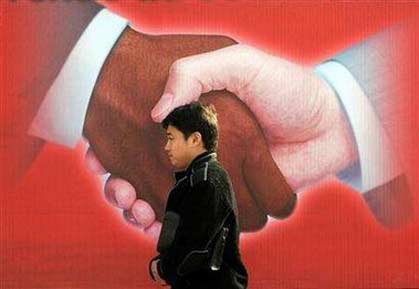Stage set for high-profile Beijing summit
By Le Tian (China Daily)Updated: 2006-11-04 08:42
 A man walks past a poster promoting the China-Africa Summit in Beijing, November 2, 2006. [Reuters]  |
In the crisp morning air of a late-autumn Beijing day, the national flags of China and 48 African countries flutter proudly around Tian'anmen Square.
At phased intervals, black limousines roll to a halt at the north gate of the Great Hall of the People.
There they are greeted by President Hu Jintao, with the giant billboard of the Sino-African Summit as the backdrop.
Hu met the presidents of the Republic of Congo, Uganda, Sierra Leone, Rwanda, Ghana, Kenya, Madagascar, Cameroon, Tanzania and Nigeria on separate occations on Friday.
Premier Wen Jiabao also met separately on Friday with the presidents of Seychelles, Sudan, the Republic of Congo, Tanzania and Uganda.
The stage is set for the Beijing Summit of the Forum on China-Africa Co-operation (FOCAC) the largest ever staged in the country since the founding of New China in 1949 and a major milestone in Sino-African relations.
China and Africa should further their co-operation within the framework of the forum in accordance with the principle of "equal consultation, mutual benefit, gradual progress, and flexible implementation and pragmatism," Vice-Premier Wu Yi said on Friday.
Wu made the remarks when addressing ministers and representatives from China and 48 African countries at the third ministerial conference of the FOCAC, which made final preparations for the high-profile Beijing Summit.
"China-Africa co-operation, bringing great benefits to both peoples, is a good example of South-South co-operation," Wu said.
Describing the forum as "an effective mechanism of conducting collective dialogue" and "an important platform for promoting effective partnership" between China and Africa, Wu said the two sides should explore and develop new forms of collaboration.
She suggested the two sides maintain close consultations to "appropriately address the new problems arising in the course of co-operation" so as to make the forum an effective platform to safeguard the shared interests of both sides.
Since the founding of the forum in 2000, Chinese leaders and foreign ministers have paid 56 visits to 41 African countries, and African leaders and foreign ministers from 46 countries have paid 155 visits to China.
Bilateral trade reached US$39.8 billion last year, quadruple the figure in 2000, according to the statistics from the Foreign Ministry.
"The last six years have been a period of accelerated contact and co-operation between China and Africa This has been a process of co-operation fulfilling both sides," Ethiopian Foreign Minister Seyoum Mesfin said at the opening of the ministerial conference.
"Co-operation between China and Africa stands on a firm foundation of trust and confidence," said Mesfin, who is also the chairman of the second ministerial conference of the forum. "This is the reason why this forum has made such progress."
In the past years, the forum has afforded China and Africa the opportunity to identify important areas of collaboration in agriculture, infrastructure, trade, investment, and human resources, Mesfin said.
"It has also created possibilities for a better understanding and for close co-ordination between the two sides on international issues."
Participants at the conference agreed that the steps taken following the second ministerial conference of the forum held in Addis Ababa, Ethiopia, in 2003 "have achieved satisfactory results."
They also discussed the draft of a declaration, which is to be submitted to the summit, and an action plan, which maps out co-operative programmes between China and Africa from 2007 to 2009 two milestone documents serving as guidelines for future China-Africa relations and co-operation between the two sides.
Meanwhile, China on Friday decided to endorse Nigeria and Cameroon with tourist destination status.
This has raised the number of African countries that Chinese tourists can visit to 12 Kenya, Tanzania, Zimbabwe, Tunisia, Ethiopia, Mauritius, Zambia, Namibia, Seychelles, Rwanda, Nigeria and Cameroon.
|
||
|
||
|
|

